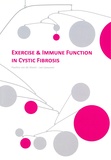Exercise and immune function in cystic fibrosis

Leeuwen, Pauline van
- Promoter:
- Prof.dr. C.K. (Kors) van der Ent
- Co-promoter:
- Dr. H.G.M. (Bert) Arets & dr. J.M. (Jeffrey) Beekman
- Research group:
- Ent
- Date:
- September 18, 2013
- Time:
- 10:30 h
Summary
In this thesis, we investigated the association between exercise, infection and inflammation in patients with Cystic Fibrosis (CF), since they have been described to be interconnected.Patients with CF spend a lot of time in physical exercises to maintain physical fitness, since exercise capacity declines during lifespan and has been described to be a good predictor of morbidity and mortality in CF patients. Cystic fibrosis is a complex genetic disease affecting multiple organs, and displays a complex chronic interplay between infection and inflammation during their lifetime. The genetic mechanisms that contribute to chronic infections remain unclear, and whether exercise can directly affect cellular consequences of the basic defect of CF is unknown. The research presented in this thesis shows that regular physical exercise not always leads to improvements of physical fitness in adolescents with CF and even may even enhance susceptibility for pulmonary infections with P. aeruginosa in some patients. We found that CFTR dysfunction in patients with CF leads to an impaired phagocytosis and killing of Pseudomonas aeruginosa by monocytes, which likely contributes to the chronic infectious status of CF patients. We did not find evidence that exercise could directly modulate phagocytic effector function at the level of individual cells. This may suggest that exercise modifies infectious susceptibility through modulation of phagocyte cell levels at target organs, rather than intrinsic cell function.